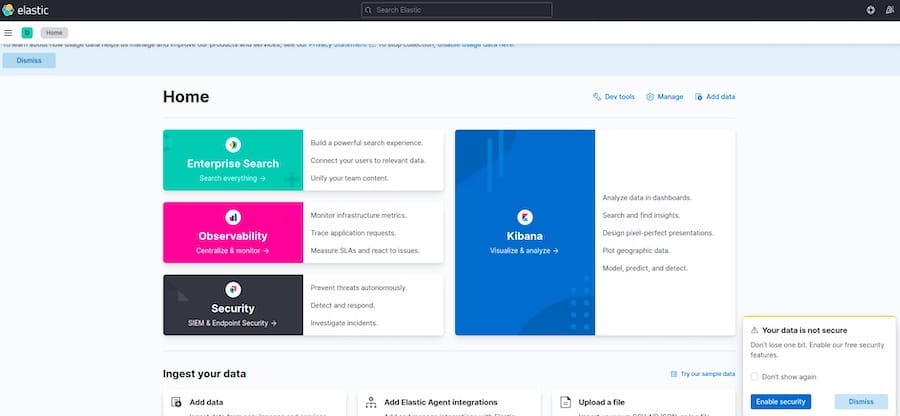How To Install ELK Stack on Linux Mint 22

In this tutorial, we will show you how to install ELK Stack on Linux Mint 22. The ELK stack has become an essential tool for system administrators and developers alike. It allows for efficient log collection, processing, and visualization, making it easier to troubleshoot issues and gain insights from your system’s data. Linux Mint users can leverage this powerful toolset to enhance their system monitoring and analysis capabilities.
Prerequisites
Before we begin the installation process, ensure that your system meets the following requirements:
- Linux Mint 22 (based on Ubuntu)
- Minimum 4GB RAM (8GB recommended for production use)
- At least 2 CPU cores
- Sudo privileges on your system
Additionally, you’ll need to install the following software:
- OpenJDK (Java Development Kit)
- Nginx web server
Understanding ELK Components
The ELK stack consists of three main components, each serving a specific purpose in the log management process:
Elasticsearch
Elasticsearch is a distributed, RESTful search and analytics engine. It serves as the central component of the ELK stack, storing and indexing the log data for quick retrieval and analysis.
Logstash
Logstash is a data processing pipeline that ingests, transforms, and forwards data to Elasticsearch. It can handle various input sources and apply filters to structure and enrich the data before sending it to Elasticsearch.
Kibana
Kibana is a web-based visualization platform that works with Elasticsearch. It provides a user-friendly interface for exploring, visualizing, and analyzing the data stored in Elasticsearch.
System Preparation
Before installing the ELK stack, we need to prepare our Linux Mint 22 system. Follow these steps to ensure a smooth installation process:
Update System Packages
First, update your system’s package list and upgrade existing packages:
sudo apt update
sudo apt upgrade -y
Install Dependencies
Install the necessary dependencies, including OpenJDK:
sudo apt install default-jdk nginx -y
Configure Firewall Settings
If you have UFW (Uncomplicated Firewall) enabled, allow traffic on the necessary ports:
sudo ufw allow 22/tcp
sudo ufw allow 80/tcp
sudo ufw allow 5601/tcp
sudo ufw allow 9200/tcp
sudo ufw allow 5044/tcp
Installing Elasticsearch
Now that our system is prepared, let’s start by installing Elasticsearch:
Add Elasticsearch Repository
First, import the Elasticsearch public GPG key:
wget -qO - https://artifacts.elastic.co/GPG-KEY-elasticsearch | sudo apt-key add -
Add the Elasticsearch repository to your system:
echo "deb https://artifacts.elastic.co/packages/7.x/apt stable main" | sudo tee /etc/apt/sources.list.d/elastic-7.x.list
Install Elasticsearch
Update the package list and install Elasticsearch:
sudo apt update
sudo apt install elasticsearch
Configure Elasticsearch
Edit the Elasticsearch configuration file:
sudo nano /etc/elasticsearch/elasticsearch.yml
Uncomment and modify the following lines:
network.host: localhost
http.port: 9200
Start and Enable Elasticsearch
Start the Elasticsearch service and enable it to run at boot:
sudo systemctl start elasticsearch
sudo systemctl enable elasticsearch
Installing Logstash
With Elasticsearch up and running, let’s move on to installing Logstash:
Install Logstash
Install Logstash using the following command:
sudo apt install logstash
Configure Logstash
Create a simple Logstash configuration file to test the installation:
sudo nano /etc/logstash/conf.d/01-beats-input.conf
Add the following content:
input {
beats {
port => 5044
}
}
output {
elasticsearch {
hosts => ["localhost:9200"]
index => "%{[@metadata][beat]}-%{[@metadata][version]}-%{+YYYY.MM.dd}"
}
}
Start and Enable Logstash
Start the Logstash service and enable it to run at boot:
sudo systemctl start logstash
sudo systemctl enable logstash
Installing Kibana
The final component of the ELK stack is Kibana. Let’s install and configure it:
Install Kibana
Install Kibana using the following command:
sudo apt install kibana
Configure Kibana
Edit the Kibana configuration file:
sudo nano /etc/kibana/kibana.yml
Uncomment and modify the following lines:
server.port: 5601
server.host: "localhost"
elasticsearch.hosts: ["http://localhost:9200"]
Start and Enable Kibana
Start the Kibana service and enable it to run at boot:
sudo systemctl start kibana
sudo systemctl enable kibana
Configuring Nginx Reverse Proxy
To securely access Kibana from a web browser, we’ll set up Nginx as a reverse proxy:
Create Nginx Server Block
Create a new Nginx server block configuration:
sudo nano /etc/nginx/sites-available/kibana
Add the following content, replacing your_domain.com with your actual domain name:
server {
listen 80;
server_name your_domain.com;
location / {
proxy_pass http://localhost:5601;
proxy_http_version 1.1;
proxy_set_header Upgrade $http_upgrade;
proxy_set_header Connection 'upgrade';
proxy_set_header Host $host;
proxy_cache_bypass $http_upgrade;
}
}
Enable the Nginx Configuration
Create a symbolic link to enable the Nginx configuration:
sudo ln -s /etc/nginx/sites-available/kibana /etc/nginx/sites-enabled/
Test and Restart Nginx
Test the Nginx configuration for any syntax errors:
sudo nginx -t
If there are no errors, restart Nginx:
sudo systemctl restart nginx
System Integration
Now that all components are installed and configured, let’s ensure they’re properly integrated:
Verify Elasticsearch Connection
Check if Elasticsearch is running and accessible:
curl -X GET "localhost:9200"
You should see a JSON response with Elasticsearch version information.
Test Logstash Pipeline
Create a simple test input for Logstash:
echo "test log entry" | sudo tee /var/log/test.log
Configure Logstash to read this file:
sudo nano /etc/logstash/conf.d/02-beats-input.conf
Add the following content:
input {
file {
path => "/var/log/test.log"
start_position => "beginning"
}
}
output {
elasticsearch {
hosts => ["localhost:9200"]
index => "test-log-%{+YYYY.MM.dd}"
}
}
Restart Logstash to apply the changes:
sudo systemctl restart logstash
Testing and Verification
Let’s verify that our ELK stack is functioning correctly:
Access Kibana Web Interface
Open a web browser and navigate to http://your_domain.com. You should see the Kibana login page.

Create an Index Pattern
In Kibana, go to Management > Stack Management > Index Patterns. Create a new index pattern for the test log we created earlier (e.g., test-log-*).
Visualize Data
Go to the Discover tab in Kibana and select your newly created index pattern. You should see the test log entry we created earlier.
Troubleshooting Guide
If you encounter issues during the installation or configuration process, consider the following troubleshooting steps:
Check Service Status
Verify that all services are running:
sudo systemctl status elasticsearch
sudo systemctl status logstash
sudo systemctl status kibana
sudo systemctl status nginx
Review Log Files
Check the log files for each component:
sudo tail -f /var/log/elasticsearch/elasticsearch.log
sudo tail -f /var/log/logstash/logstash-plain.log
sudo tail -f /var/log/kibana/kibana.log
sudo tail -f /var/log/nginx/error.log
Verify Firewall Settings
Ensure that the necessary ports are open:
sudo ufw status
Congratulations! You have successfully installed ELK Stack. Thanks for using this tutorial for installing the ELK Stack open-source log analytics platform on Linux Mint 22 system. For additional or useful information, we recommend you check the official ELK Stack website.